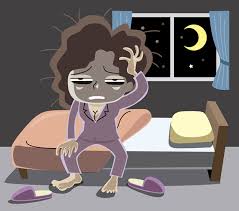Many times I have come across people who find it hard
getting to sleep as compared to others, one of the common complaints associated
with this condition include having a hangover feeling or headache. This condition of sleeplessness can also be referred to as Insomnia.
Description
Insomnia can often also be regarded to as a state of
sleeplessness, especially at night. People suffering from insomnia often have
troubles falling asleep or staying asleep as much as they are required to. It
often reduces the active level of an individual and can often attract other
forms of ailments and discomforts. It can occur on its own or as a result of an
underlying condition.
There are three main types of Insomnia:
- · Transient Insomnia- This is temporary and often lasts for less than a week. It is often caused by another disorder, change in sleeping environment or timing of sleep, depression or stress.
- · Acute Insomnia- Also referred to as short term or stress related insomnia, this type of sleeplessness often lasts for less than a month.
- · Chronic Insomnia- It lasts for longer than a month and is often caused by another disorder. It is more common in people with high level of stress hormones and can often cause double vision.
Some of the
symptoms of Insomnia include
- · Inability to fall asleep
- · Inability to stay asleep
- · Often feeling discomfort during sleep
- · Inability to return to sleep after waking up probably in the middle of the night
Dangerous Effects
of Insomnia include
- · Low energy level and feeling irritated
- · Sleepiness during the day time
- · Headaches or hangover feeling
- · Reduced power of concentration which also often leads to accidents while driving.
- · Depressed mood.
Causes
- · Consumption of caffeine
- · Use of stimulants and certain medication including nicotine, cocaine and alcohol.
- · Heart diseases
- · Breathing disorders
- · Pain
- · Gastrointestinal disorders
- · Mental imbalance.
- · Abuse of sedative or depressant medications
- · Poor sleep hygiene
- · Life events such as; fear, stress, anxiety, emotional or mental tension, work problems, financial stress, childbirth or bereavement
- · Shift works and jet lags can also cause inability to sleep and also excessive sleepiness at certain times of the day
Preventions
- · Adopting a regular sleeping pattern like having a set bedtime and wake up time can help prevent insomnia.
- · Avoidance of vigorous exercise and caffeinated substances towards bed time is also advisory.
- · Also try keeping your bedroom environment neat and cozy, avoid distractions such as phones, laptops or mentally tasking activities. Dimmer lights and cooler environments are a good step.
- Also try taking dinner in good time to avoid digestive complications.
Treatment
- · Developing a healthy sleep hygiene is very important in the treatment of insomnia
- · In cases where insomnia causes discomfort it is advised to see a medical doctor for proper diagnosis as medication can also be prescribed to help boost your sleep.
Conclusion
Insomnia has been recorded to occur for everyone at some points in their lives, however taking the prevention tips will help reduce its chances. Also a healthy consumption of water and fruits is advised to boost the body in general and this can also enable us get better sleep. If you find yourself staying up at night, try finding a more comfortable position to sleep and you can also consume a glass of water, it works for some people. I really do hope we were able to get some good insights on the topic from this article. Stay healthy............ CHEERS .😄
Source; wikipedia.



Comments
Post a Comment